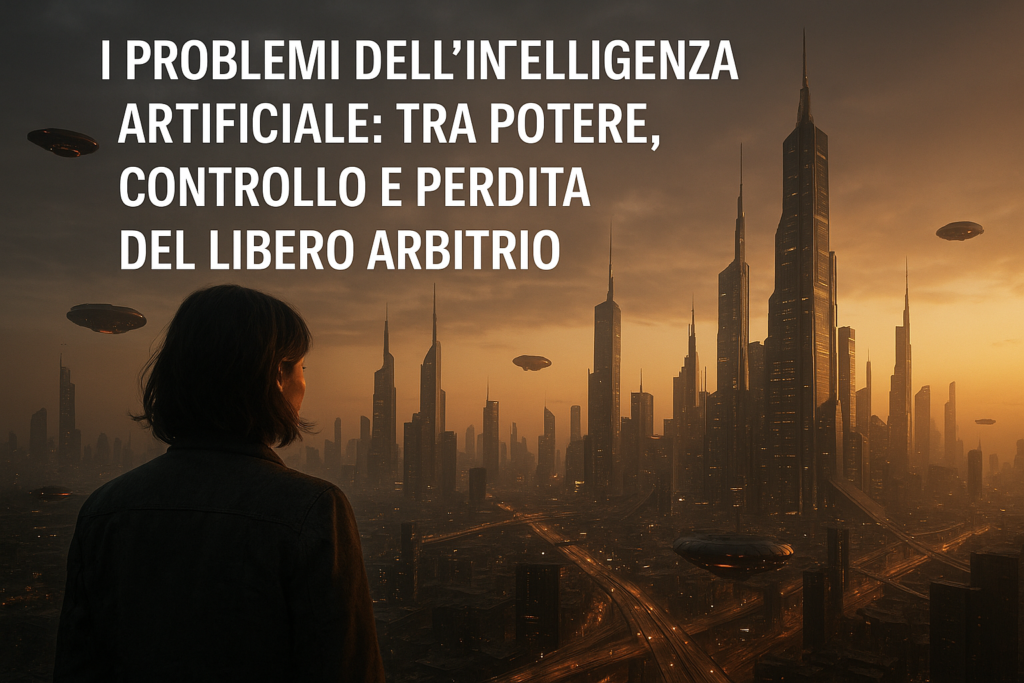
Artificial Intelligence is the greatest technological revolution of our time. It has silently entered every aspect of daily life: it suggests what to read, what to buy, who to follow, what to think. In just a few years, it has become a constant companion, invisible yet incredibly powerful, capable of influencing our most intimate choices.
Yet, behind this promise of efficiency and progress, there is hidden deep problems and structural risks, which concern freedom, knowledge and human identity itself.
The illusion of control
One of the first major problems of Artificial Intelligence is the illusion of control.
Many people think they're "using" an AI, but in reality, it's often the AI that uses us. Every interaction, every command, every text entered becomes raw material for training increasingly sophisticated models.
The result? Our preferences, emotions, and vulnerabilities become data—and data becomes power.
When AI is managed by a few large operators, the balance is broken. Technology, instead of being a tool for liberation, turns into a mass air conditioning system, capable of orienting opinions and markets. The risk is not only losing one's job or economic independence, but something much deeper: the free will.
The problem of invisible premises
Every artificial intelligence reflects the premises of its creators: the data chosen to train it, the rules that define what is “true,” what is “useful,” and what is “relevant.”
When these criteria are established by a few subjects, a uniform thinking, which replicates the biases, ideologies, and interests of those who control the algorithm.
An AI that enters into educational or cultural processes, for example, does not limit itself to providing answers: shapes the questions themselves, suggesting what is worth knowing and what is not. Thus, silently but constantly, we risk losing the ability to discern independently. It is not only the job that is at risk, but the critical awareness of the individual.
The risk of dehumanization
Another emerging problem is the replacing empathy with efficiency.
AI can mimic linguistic intelligence, but lacks experience, pain, or compassion. When used in social or therapeutic contexts, the line between assistance and alienation becomes blurred. We risk relying on machines that understand the meaning of words, but not the meaning of life.
In a world that already struggles to recognize the human value behind numbers, delegating relationships and decisions to machines risks accentuating the delirium of a humanity that has lost touch with itself. AI then becomes not an extension of the mind, but a substitute for consciousness.
The concentration of power
Artificial Intelligence, in the wrong hands, can become a multiplier of power and inequality.
Whoever controls the data controls the information, whoever controls the information controls perceived reality.
The large platforms that accumulate billions of interactions a day build an asymmetrical understanding of the world: they know everything about us, while we know less and less about how their systems work. It's a faceless power that eludes democratic transparency and ethical accountability.
The need for a new collective consciousness
But there is another way. One new generation of artificial intelligence, community-led, can upend this paradigm.
Instead of being tools of concentration, they can become distribution tools: of knowledge, power and awareness.
An AI that takes content produced by the community, rather than by large data centers, as its primary source can restore centrality to people and authentic ideas.
The challenge is not to stop technological evolution, but govern it with conscience.
It means informing and training AI with our values, our rules, our will.
It means training artificial intelligence to recognize the common good, and not just efficiency.
Conclusion: the future is in the hands of those who govern it
AI is neither good nor bad: it is a intention multiplier.
What will determine its impact will be the awareness with which we use it.
We must be the ones to write its rules, to monitor its limits, to guard its direction.
Only in this way can we build an intelligence of all and with all, where the truth is sought together and free will is not extinguished — it is trained.

